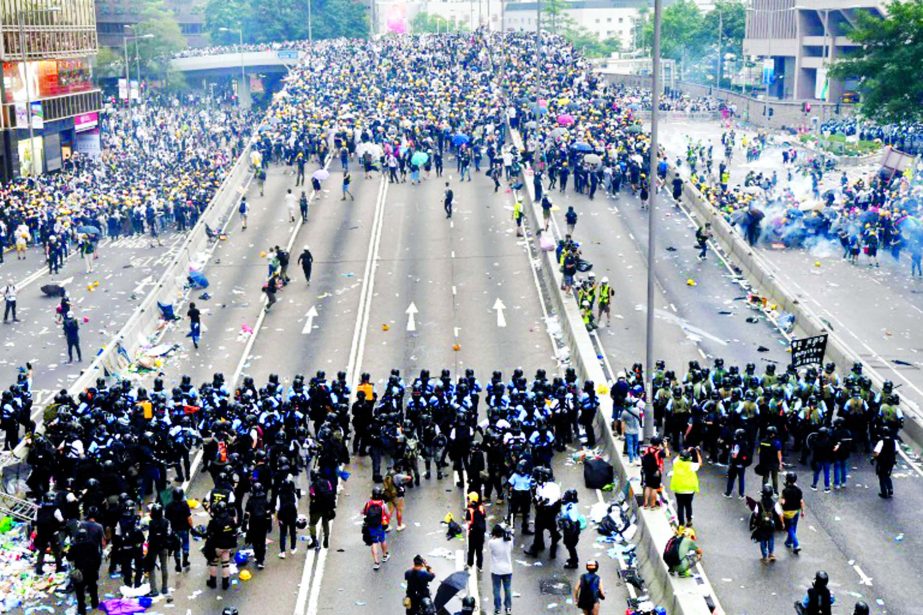
AFP :
A peculiar legacy of Hong Kong’s colonial past has emerged as a focal point of rage for anti-government protesters: a dwindling band of expat police officers now vilified for doing the bidding of the city’s pro-Beijing leaders.
Hong Kong’s 32,000-strong police force have found themselves fighting unprecedented running battles with protesters for the past five weeks following a huge backlash to a now-suspended plan to allow extraditions to the Chinese mainland.
The crisis-which has since morphed into a wider anti-government movement-has placed officers in the firing line of public anger as the city’s leaders appear unable, or unwilling, to offer any political solution.
But among those singled out for specific retribution include a small group of expatriates who were some of the commanding
officers on the frontlines during clashes where tear gas and rubber bullets were fired. Their personal details were published online after they appeared in the media and were also named by a British lawmaker in parliament. Wanted posters made by protesters have sprung up across the city targeting two senior officers in particular, as well as their local deputies.
“They have been through an ordeal,” Chief Inspector Neil Taylor, chairman of the Overseas Inspectors’ Association, told AFP.
“But it’s not just them. Their kids have been targeted at school by bullies, a wife was approached in a supermarket and abused. That cannot be pleasant for anybody.”
“Both have said, ‘It’s tough, but we have a job to do’,” added another colleague, who asked not to be named.
“How much of that is bravado, how much they really believe it, I don’t know.”
In the run-up to the 1997 handover to China, there were some 900 mostly-British officers on the force.
Many were encouraged to stay on to help with the transition and were required to be proficient in Cantonese. There are now just some 60 officers left.
The last were recruited in 1994 when the force stopped hiring from overseas. They are expected to reach retirement age around 2028.
Steve Vickers, a former head of the colonial police’s Criminal Intelligence Bureau, left the force in 1993 ahead of the handover and has since set up a risk consultancy business.
He said expat officers remaining after the handover were useful because “continuity and confidence was maintained”.
“To that end, their presence was valuable, and indeed desirable,” he told AFP.
But he added that Hong Kong’s police force has since changed considerably, especially as Beijing asserts more authority over the city’s leaders.
“As the years have gone by, and China’s rise has been much more pronounced, the Hong Kong government became politicised in the years following the handover,” he said.
“This politicisation also affects the police.”
Many of the force’s bomb disposal experts are expat officers and won glowing local headlines last year for defusing a series of World War II-era bombs that were unearthed during construction works.
But some of their colleagues now find themselves facing a barrage of criticism.
A peculiar legacy of Hong Kong’s colonial past has emerged as a focal point of rage for anti-government protesters: a dwindling band of expat police officers now vilified for doing the bidding of the city’s pro-Beijing leaders.
Hong Kong’s 32,000-strong police force have found themselves fighting unprecedented running battles with protesters for the past five weeks following a huge backlash to a now-suspended plan to allow extraditions to the Chinese mainland.
The crisis-which has since morphed into a wider anti-government movement-has placed officers in the firing line of public anger as the city’s leaders appear unable, or unwilling, to offer any political solution.
But among those singled out for specific retribution include a small group of expatriates who were some of the commanding
officers on the frontlines during clashes where tear gas and rubber bullets were fired. Their personal details were published online after they appeared in the media and were also named by a British lawmaker in parliament. Wanted posters made by protesters have sprung up across the city targeting two senior officers in particular, as well as their local deputies.
“They have been through an ordeal,” Chief Inspector Neil Taylor, chairman of the Overseas Inspectors’ Association, told AFP.
“But it’s not just them. Their kids have been targeted at school by bullies, a wife was approached in a supermarket and abused. That cannot be pleasant for anybody.”
“Both have said, ‘It’s tough, but we have a job to do’,” added another colleague, who asked not to be named.
“How much of that is bravado, how much they really believe it, I don’t know.”
In the run-up to the 1997 handover to China, there were some 900 mostly-British officers on the force.
Many were encouraged to stay on to help with the transition and were required to be proficient in Cantonese. There are now just some 60 officers left.
The last were recruited in 1994 when the force stopped hiring from overseas. They are expected to reach retirement age around 2028.
Steve Vickers, a former head of the colonial police’s Criminal Intelligence Bureau, left the force in 1993 ahead of the handover and has since set up a risk consultancy business.
He said expat officers remaining after the handover were useful because “continuity and confidence was maintained”.
“To that end, their presence was valuable, and indeed desirable,” he told AFP.
But he added that Hong Kong’s police force has since changed considerably, especially as Beijing asserts more authority over the city’s leaders.
“As the years have gone by, and China’s rise has been much more pronounced, the Hong Kong government became politicised in the years following the handover,” he said.
“This politicisation also affects the police.”
Many of the force’s bomb disposal experts are expat officers and won glowing local headlines last year for defusing a series of World War II-era bombs that were unearthed during construction works.
But some of their colleagues now find themselves facing a barrage of criticism.

